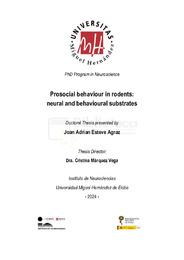Por favor, use este identificador para citar o enlazar este ítem:
https://hdl.handle.net/11000/36739
Prosocial behaviour in rodents: neural and behavioural substrates
Título :
Prosocial behaviour in rodents: neural and behavioural substrates |
Autor :
Esteve Agraz, Joan Adrian |
Tutor:
Márquez Vega, Cristina |
Editor :
Universidad Miguel Hernández |
Fecha de publicación:
2024-12-13 |
URI :
https://hdl.handle.net/11000/36739 |
Resumen :
Prosocial behaviors, actions that benefit others, are an essential part of the social life of humans and other animals, by promoting bonding and cohesion among individuals and groups. To study prosociality in rodents, scientists have developed behavioral paradigms where animals can display actions that improve the welfare of conspecifics in distress or need. Studies using these paradigms have provided insights into the role of social interactions and transfer of emotional states in the expression of prosociality, and into its neural bases. Rodents are thus powerful models to study these process as demonstrated by the intense research in the last years which is rapidly advancing our knowledge. Yet, despite the importance of positively valenced interactions in social cognition, most of our understanding on the neural circuits of prosocial actions and shared emotions is based in the study of negative affective states (stress, fear or pain). Here we developed different behavioural paradigms to assess prosociality and emotional transfer in reward-based contexts with mice and rats. Our work revealed that prosociality by reward provision is not a widespread phenomenon in mice as compared to rats, highlighting the very distinct social dynamics these two species display. Nevertheless, when prosociality was observed in mice, it was rooted in the same behavioural mechanisms that we have previously described in rats. Furthermore, we demonstrate that rats are capable of perceiving rewarding states from conspecifics, which is encoded as increases of ventral tegmental area (VTA) activity while witnessing a partner rat being rewarded. Finally, we found that these vicarious reward signals in the VTA are incorporated to guide social decisions that affect conspecifics. Optogenetic inhibition of the VTA neurons of decision-maker rats time-locked to the reward delivered to the partner in prosocial trials blocked the emergence of prosocial tendencies. We thus demonstrate that vicarious reward signals in rats are necessary for the emergence of prosociality, and that perceiving the rewarding states of others is the motivation underlying this interesting process. The results presented in this thesis provide an arising understanding of the behavioural and neural basis complementing our knowledge about the motivations of rodents to help others in positive contexts.
|
Palabras clave/Materias:
Neurociencias
Circuitos neuronales |
Área de conocimiento :
CDU: Ciencias aplicadas: Medicina: Patología. Medicina clínica. Oncología: Neurología. Neuropatología. Sistema nervioso |
Tipo de documento :
info:eu-repo/semantics/doctoralThesis |
Derechos de acceso:
info:eu-repo/semantics/openAccess
Attribution-NonCommercial-NoDerivatives 4.0 Internacional |
Aparece en las colecciones:
Tesis doctorales - Ciencias de la Salud
|
 La licencia se describe como: Atribución-NonComercial-NoDerivada 4.0 Internacional.
La licencia se describe como: Atribución-NonComercial-NoDerivada 4.0 Internacional.
 La licencia se describe como: Atribución-NonComercial-NoDerivada 4.0 Internacional.
La licencia se describe como: Atribución-NonComercial-NoDerivada 4.0 Internacional.
.png)
